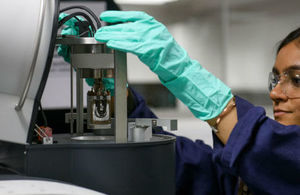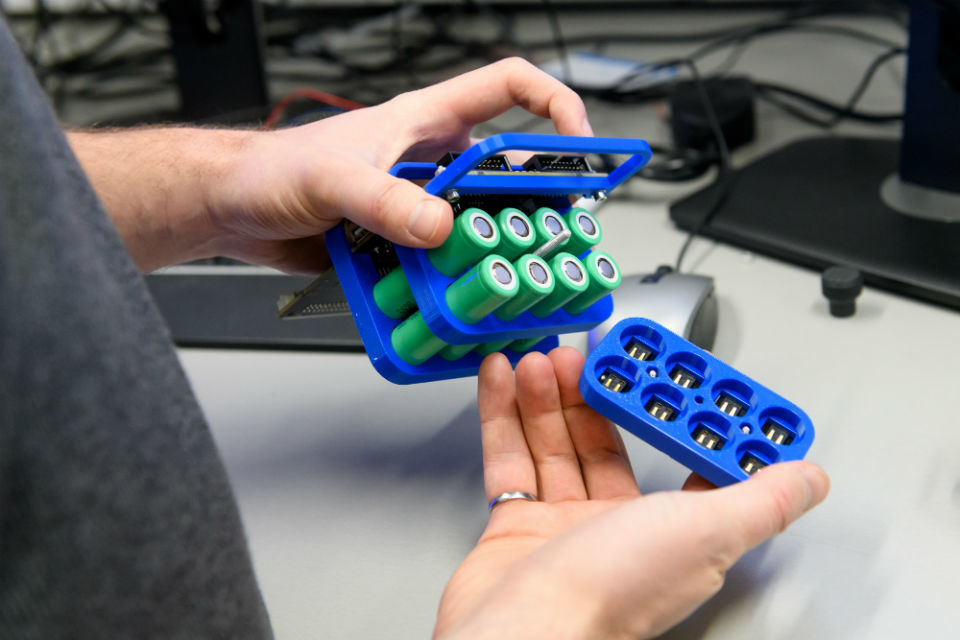Future electric vehicle batteries: long-lasting, cleaner, better
£40 million Industrial Strategy Challenge Fund investment in business and research will develop the next generation of automotive batteries.

UCL battery research laboratory.
New projects by UK businesses and researchers will tackle some of the biggest challenges preventing the uptake of electric vehicles in the UK.
A total of 27 projects involving 66 organisations will share around £40 million to support the design, development and manufacture of batteries for the electrification of vehicles.
The grant funding comes from Innovate UK under the Industrial Strategy Challenge Fund.
Improved battery management
A major barrier in electric vehicle adoption is their lifespan and range.
Current electric vehicle batteries aren’t as good as their combustion engine counterparts and degrade quickly. Drivers are also unsure of their vehicle’s ability to cover certain distances due to charge levels and limited charge infrastructure.
Clean-tech start-up Brill Power will lead a consortium to address this.
Faraday Battery Challenge. ISCF winners. Brill Powers
Christoph Birkl, CEO, Brill Power, said:
We have to improve batteries, we have to make sure we can get more energy into every battery, we have to make sure we can get them as efficient as possible, get every joule of energy out of those batteries to make them live as long as the cars live.
Working with E-Car, it will explore how its battery management control system can be used to enhance the battery manufacture and performance of electric vehicles.
Christoph continued:
At Brill Power we’ve developed battery control and management technology that can make lithium-ion batteries live for up to 60% longer.
We do that by individually managing every cell in a battery pack without having to replace the entire battery. We can just replace the individual modules.
Reuse, remanufacture, recycle
As the number of electric vehicles grows, we also need to consider how we deal with batteries once they come to the end of their life and can no longer be used in the initial automotive application.
HSSMI, an independent institute specialising in the application of digital techniques within manufacturing, is the lead of one project addressing this issue, which involves multiple businesses and UCL (University College London).
Faraday Battery Challenge. ISCF winners. HSSMI
Paul Shearing, Reader in Chemical Engineering & Materials, UCL, said:
When a battery is beginning to reach its end of life in an automotive application - perhaps when it falls down to about 80% of its original rated capacity - it still has a huge amount of value for a second life type of application.
Caroline Guest, Manager of Electric Powertrains and Circular Value Chains, HSSMI, added:
You can combine it with things like solar power and wind. It’s also being looked at for rail and marine applications as back up batteries as well.
The project will look at taking end-of-life, automotive lithium-ion batteries, and either reusing, remanufacturing or recycling them. It will build a complete supply chain network and legal and regulatory knowledge in the UK.
In doing so, the project will help to optimise battery design and increase use in second-life applications, improve recyclability and whole-life environmental impact, while building UK capabilities.
Other projects
The projects being lead by Brill Power and HSSMI are just 2 that will receive government investment.
Others to get funding under this competition aim to:
- create a safe, economically sustainable battery recycling supply chain in the UK, which allows industrial batteries from vehicles to be recycled into base components and materials and then reused. Johnson Matthey is the lead
- build the UK as a hub for battery cell manufacture. The lead is AGM Batteries
- develop battery modules and packs for a range of vehicles, including supercars, buses and diggers. Delta Motorsport is the lead
- develop a new battery storage system for heavy-duty vehicles. The lead is Perkins Engines

A Brill Power battery pack.
Co-ordinated programme of investments
Business and Energy Secretary, Greg Clark, announced the investment in innovation projects at Battery and Energy Storage 2017.
Also in the announcement was the UK’s first automotive battery manufacturing development facility, which will be built from an £80 million investment through the Advanced Propulsion Centre.
Leading the development are the Coventry and Warwickshire Local Enterprise Partnership with Warwick Manufacturing Group (WMG). The facility will allow the UK to develop new processes to manufacture pioneering battery technology at high-volume, giving us a competitive advantage.
It follows on from last month’s Industrial Strategy Challenge Fund announcement of the multi-million-pound Faraday research institution. This institution will accelerate fundamental research and development of battery technologies. It is being funded through the Engineering and Physical Sciences Research Council (EPSRC).
The Faraday Battery Challenge
Government’s Industrial Strategy Challenge Fund is bringing together UK research organisations with businesses to tackle the biggest industrial and societal challenges we are facing.
The Faraday Battery Challenge is one strand within the fund. This is a £246 million investment by government over 4 years. It aims to develop safe, cost effective, durable, lighter weight, high-performing and recyclable batteries in the UK to power the next generation of electric vehicles.
Ultimately, these innovations should help grow UK businesses and make the nation a world leader in battery technology.
Apply for funding
For businesses and researchers with ideas to support the electric vehicle batteries of the future, the next funding opportunity will open in January 2018.
Updates to this page
-
Updated link to full list of Faraday Battery Challenge projects to win funding.
-
First published.